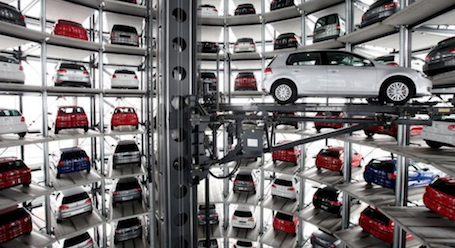The European Commission has fined German carmakers Volkswagen and BMW a total of €875 million for colluding to curb the use of emissions cleaning technology they had developed.
Under a settlement, Volkswagen will pay a fine of €502 million and BMW will pay €373 million.
Daimler, also part of the cartel, was not fined as it revealed the existence of the cartel to the Commission.
“The European Commission has found that Daimler, BMW and Volkswagen group (Volkswagen, Audi and Porsche) breached EU antitrust rules by colluding on technical development in the area of nitrogen oxide cleaning ..” said the Commission.
“”All parties acknowledged their involvement in the cartel and agreed to settle the case.”
Executive Vice-President of the Commission Margrethe Vestager, in charge of competition policy, said: “The five car manufacturers Daimler, BMW, Volkswagen, Audi and Porsche possessed the technology to reduce harmful emissions beyond what was legally required under EU emission standards.
“But they avoided to compete on using this technology’s full potential to clean better than what is required by law.
“So today’s decision is about how legitimate technical cooperation went wrong.
“And we do not tolerate it when companies collude.
“It is illegal under EU Antitrust rules.
“Competition and innovation on managing car pollution are essential for Europe to meet our ambitious Green Deal objectives.
“And this decision shows that we will not hesitate to take action against all forms of cartel conduct putting in jeopardy this goal.”
The Commission said the car manufactures held regular technical meetings to discuss the development of the selective catalytic reduction (SCR)-technology which eliminates harmful nitrogen oxide (NOx)-emissions from diesel passenger cars through the injection of urea — also called AdBlue — into the exhaust gas stream.
During these meetings, and for over five years, the car manufacturers colluded to avoid competition on cleaning better than what is required by law despite the relevant technology being available.
“More specifically, Daimler, BMW and Volkswagen group reached an agreement on AdBlue tank sizes and ranges and a common understanding on the average estimated AdBlue-consumption,” said the Commission.
“They also exchanged commercially sensitive information on these elements.
“They thereby removed the uncertainty about their future market conduct concerning NOx-emissions cleaning beyond and above the legal requirements (so called ‘over-fulfilment’) and AdBlue-refill ranges.
“This means that they restricted competition on product characteristics relevant for the customers.
“That conduct constitutes an infringement by object in the form of a limitation of technical development, a type of infringement explicitly referred to in Article 101(1)(b) of the Treaty and Article 53(1)(b) of the European Economic Area (EEA)-Agreement.
“The conduct took place between 25 June 2009 and 1 October 2014.”
Volkswagen said it was considering whether to take legal action, claiming the penalty over technical talks about emissions technology set a questionable precedent.
“The Commission is entering new judicial territory, because it is treating technical cooperation for the first time as an antitrust violation,” Volkswagen said.
“Furthermore it is imposing fines, although the content of the talks was never implemented and no customers suffered any harm as a result,” Volkswagen added.
Volkswagen called for clearer guidelines, saying: “The high fines imposed in this case underscore the need for more comprehensive guidance from the Commission to ensure that legal uncertainty does not hamper innovation in Europe.”
BMW said it had been cleared of suspicion of using illegal “defeat devices” to cheat emissions tests.
“This underlines that there has never been any allegation of unlawful manipulation of emission control systems by the BMW Group,” BMW said in a statement.
